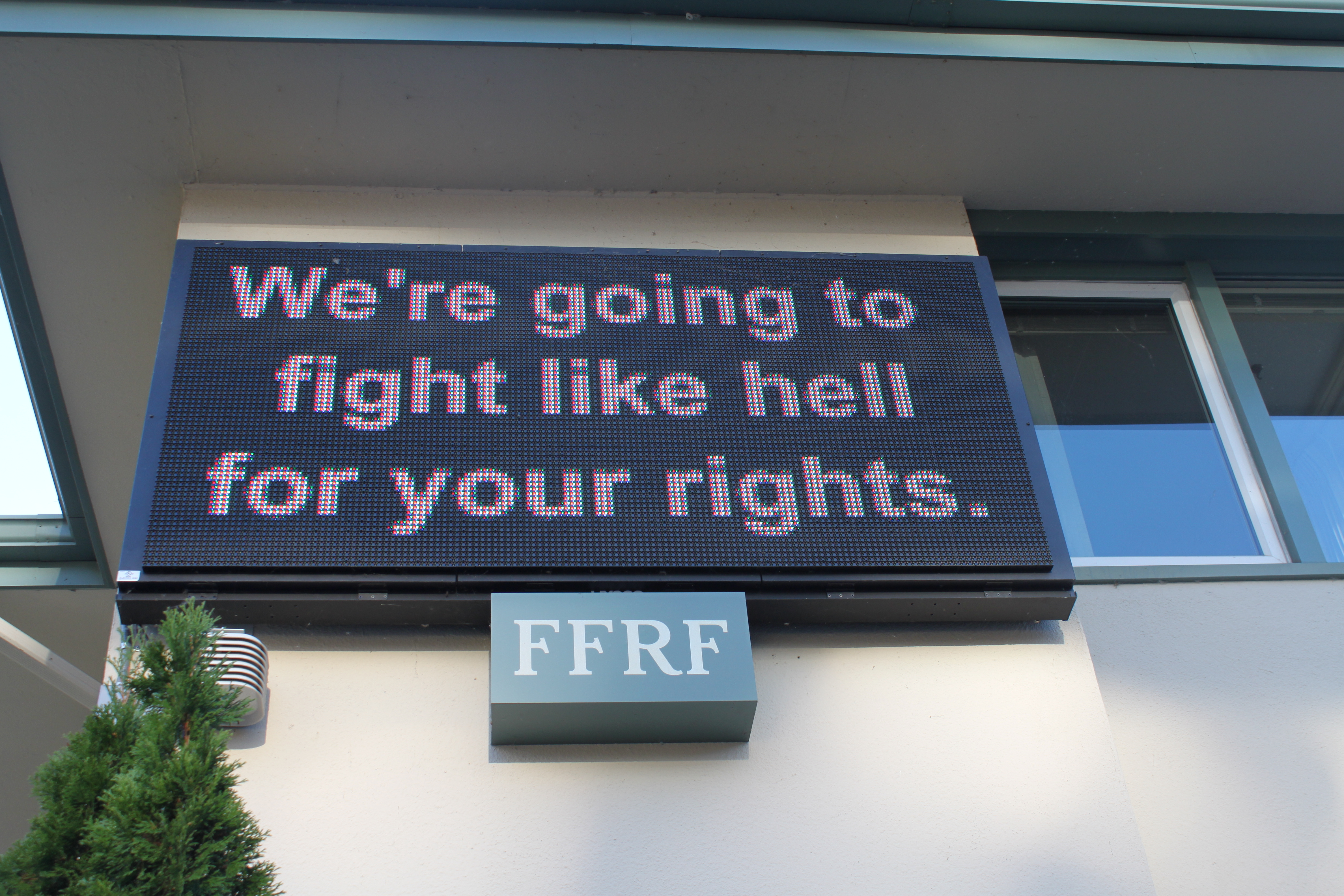Mobile Menu

Lauryn Seering
FFRF fruitfully tutors Wisconsin city about U.S. Constitution
 The Freedom From Religion Foundation has taught a Wisconsin city the basics of the U.S. Constitution.
The Freedom From Religion Foundation has taught a Wisconsin city the basics of the U.S. Constitution.
Earlier this year, the city of Kenosha's Mayor's Youth Commission voted 5-2 to give $500 to St. Mark the Evangelist Catholic Church for an Easter retreat for two of the church's youth groups, God 1st and J-Walkers. FFRF alerted the city that the grant was unconstitutional and asked it to refrain from awarding such grants in the future.
"The Establishment Clause of the First Amendment prohibits the government from financially supporting religious activities," FFRF Legal Fellow Ryan Jayne wrote to Kenosha City Administrator Frank Pacetti in May. "The city of Kenosha may not fund a church's religious activities, including Easter youth retreats."
Pacetti replied to FFRF after almost a six-month delay, contending that since the funds were private donations raised from sales of memorial bricks at a local park, and not from tax proceeds, it wasn't engaging in a constitutional violation.
FFRF set the record straight in a quick follow-up communication, informing Kenosha that the source of the funding didn't make a difference.
"The Establishment Clause prohibits the city from funding religion, regardless of how the city acquired the funds," Jayne wrote. "No matter how the government categorizes a grant, the city must abide by the First Amendment when it awards funds."
FFRF clarified that the Mayor's Youth Commission, which voted to grant the money, is a city entity. Moreover, the city did not warn the memorial brick donors that their funds would go toward advancing religion.
FFRF's persistence has paid off. In a recent letter, Pacetti confirmed that Kenosha's mini-grant program had been terminated.
"The city of Kenosha has been and will continue to be vigilant in its efforts to protect the constitutional rights of all of its citizens," Pacetti wrote back. "In furtherance of this goal and in the hopes of finally putting this disputed issue to rest, I wish to advise you that the mini-grant program is being discontinued."
FFRF is heartened that it was able to enlighten the city of Kenosha.
It was not necessary to throw out the baby (the youth grants) with the bathwater (unconstitutional funding policies), but we're glad our reasoning got through to Kenosha officials, says FFRF Co-President Annie Laurie Gaylor.
The Freedom From Religion Foundation is a Wisconsin-based organization dedicated to the separation of state and church, with almost 24,000 members, including more than 1,300 in Wisconsin.
Create a virtual billboard for Openly Secular Day!
Openly Secular Day is celebrated on Tuesday, Nov. 15, this year. The Freedom From Religion Foundation is proud to put its unique stamp on the commemoration.
The mission of Openly Secular Day is to eliminate discrimination and increase acceptance by getting secular people to be open about their beliefs. FFRF has an Out of the Closet Campaign as its artistic contribution.

For the past five years, the Freedom From Religion Foundation has had an active online campaign that invites nonbelievers everywhere to "come out of the closet, to declare and share your nonbelief." FFRF ,the largest atheist/agnostic association in the United States, debuted the "Out of the Closet" personalized public relations campaign in the fall of 2011 featuring real nonbelievers, their views and their faces on bus signs and billboards.

"Although we can't put everyone on a real billboard, every nonbeliever can participate in this unique 'cyberboard' campaign," explains FFRF Co-President Dan Barker.
FFRF's interactive site exhorts nonbelievers to "help dispel myths, educate and promote reason by adding your voice, face and message to FFRF's friendly neighborhood freethinker campaign."
The elegantly simple interactive application lets any nonbeliever upload their photo, coin a phrase about their nonbelief, identify themselves and choose from a dropdown list a label that most closely describes their philosophical position on religion. Choices include "atheist, agnostic, skeptic, infidel, humanist, secularist" or even the tongue-in-cheek "Pastafarian." Once the submitted "cyberboard" gets FFRF's stamp of approval, the personalized virtual billboard is posted at FFRF's website and the image used by the participant on social media.

"The main goal of FFRF's Out of the Closet campaign — real and virtual — is to make a difference in how atheists and agnostics are perceived by our society," says FFRF Co-President Annie Laurie Gaylor. "Although the nonreligious are almost one-fourth of the U.S. population, many Americans have never knowingly met a nonbeliever. Now, more than ever, we need to make ourselves be known publicly."
So, on the occasion of Openly Secular Day, sign up for FFRF's billboard campaign. And check out events nationwide to celebrate the day, including a memorable gathering at the UW Madison campus that features Julia Sweeney, Hemant Mehta and FFRF's own Rebecca Markert. Note: the event is in the Social Sciences room: 5208.
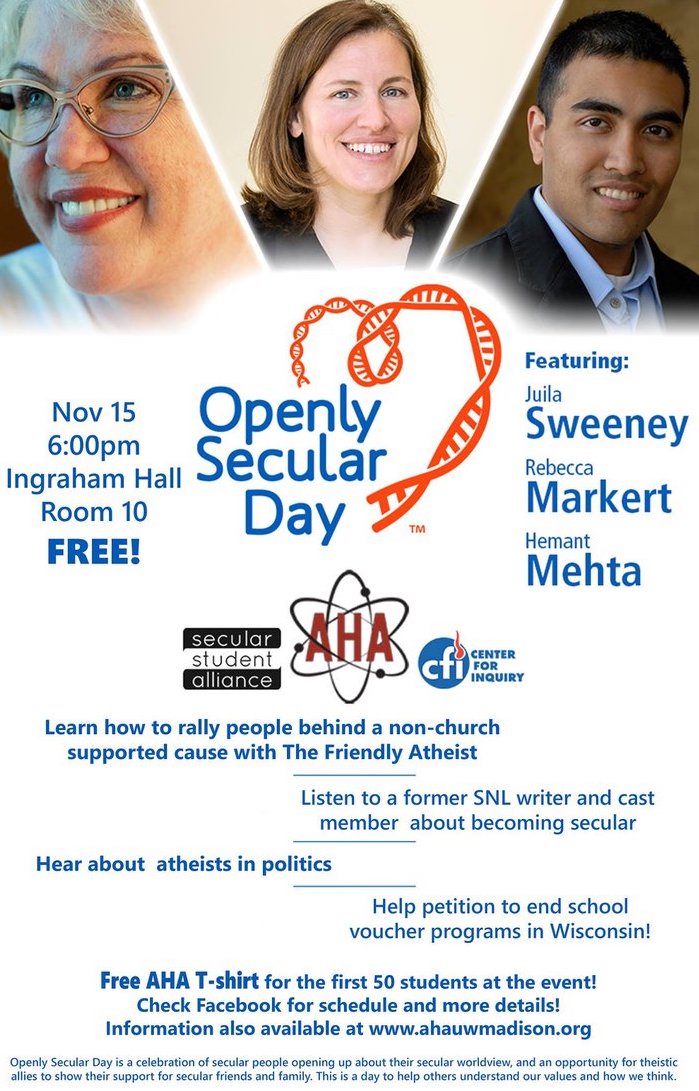
The Freedom From Religion Foundation, based in Madison, Wis., has been working since 1978 to keep religion and government separate.
FFRF persuades Ohio village to remove religious seal and declaration
 An Ohio village has removed a religious seal and declaration after objections from the Freedom From Religion Foundation, a national state/church watchdog organization.
An Ohio village has removed a religious seal and declaration after objections from the Freedom From Religion Foundation, a national state/church watchdog organization.
The seal of the village of Archbold contained a church at its center, nestled within images of education, farming, forestry and industry. The seal was featured in a number of places, including government buildings, street signs, village forms and documents, such as utility bills, and on the official website. The website also contained on its history page a declaration that Archbold a "Christian community."
Such a seal and statement were unconstitutional, FFRF informed the village.
"The inclusion of a church on the official village seal and declaration that the village 'is a Christian community' violate the Establishment Clause of the First Amendment," FFRF Legal Fellow Madeline Ziegler wrote to Archbold Mayor Jim Wyse last year. "Federal courts have ruled that similar seals violate the Establishment Clause."
FFRF suggested to the village that changing the seal would make sense in other ways, as well. Nearly 30 percent of Americans are non-Christian, including 43 percent of Millennials, practicing a minority religion or no religion at all. To have a religious seal and declaration alienates and ostracizes this huge portion of the population.
It took a lot of time and three follow-up letters, but FFRF has been able to persuade the village of Archbold. The seal has been changed to remove the cross. (The Christian declaration was removed from the website immediately after FFRF's first letter.)
FFRF is gratified at its ability to change minds.
"We're happy that we were finally able to persuade the village," says FFRF Co-President Annie Laurie Gaylor. "The church symbol and the declaration of Christian heritage were blatant endorsements of a particular religion."
The Freedom From Religion Foundation is a national nonprofit organization with more than 23,000 nonreligious members across the country, including 600-plus in Ohio.
FFRF issues USA Today ad commemorating Veterans Day

The Freedom From Religion Foundation is taking out a Veterans Day ad with USA Today that honors those who have served, especially freethinkers. About a quarter of FFRF's members are veterans or in the military.
The ad is in a special edition of USA Today being distributed on Veterans Day, Nov. 11, with an initial print run of 800,000. It is being sent out for free to the Pentagon, the U.S. Congress, the Army, Navy and Air Force headquarters, 250 military bases nationwide, key VA officials and a number of veterans organizations. Additionally, 1 million military personnel are receiving a digital copy.
The ad appeals to the almost one-fourth of veterans who are nonbelievers. "You've been fighting for our secular Constitution and our freedom — let us fight for you," it says. It features a photo of World War II veteran and FFRF Board Member Joe Cunningham in front of the "Atheists in Foxholes" monument at FFRF's office building, Freethought Hall, in downtown Madison, Wis. The monument, which was dedicated last year during a grand opening celebration for the renovated Freethought Hall, is dedicated to "ATHEISTS IN FOXHOLES and the countless freethinkers who have served this country with honor and distinction. Presented with hope that in the future humankind may learn to avoid all war."
"Contrary to that tired, untrue cliché, there are indeed many 'atheists in foxholes,' and we're reaching out to them," says FFRF Co-President Annie Laurie Gaylor.
The Freedom From Religion Foundation is a Madison, Wis.-based national state/church watchdog organization with almost 24,000 nonreligious members all over the country, including thousands of people who are serving or have served our nation.
Bizarre shift cancels Madison’s Freethought Radio broadcast
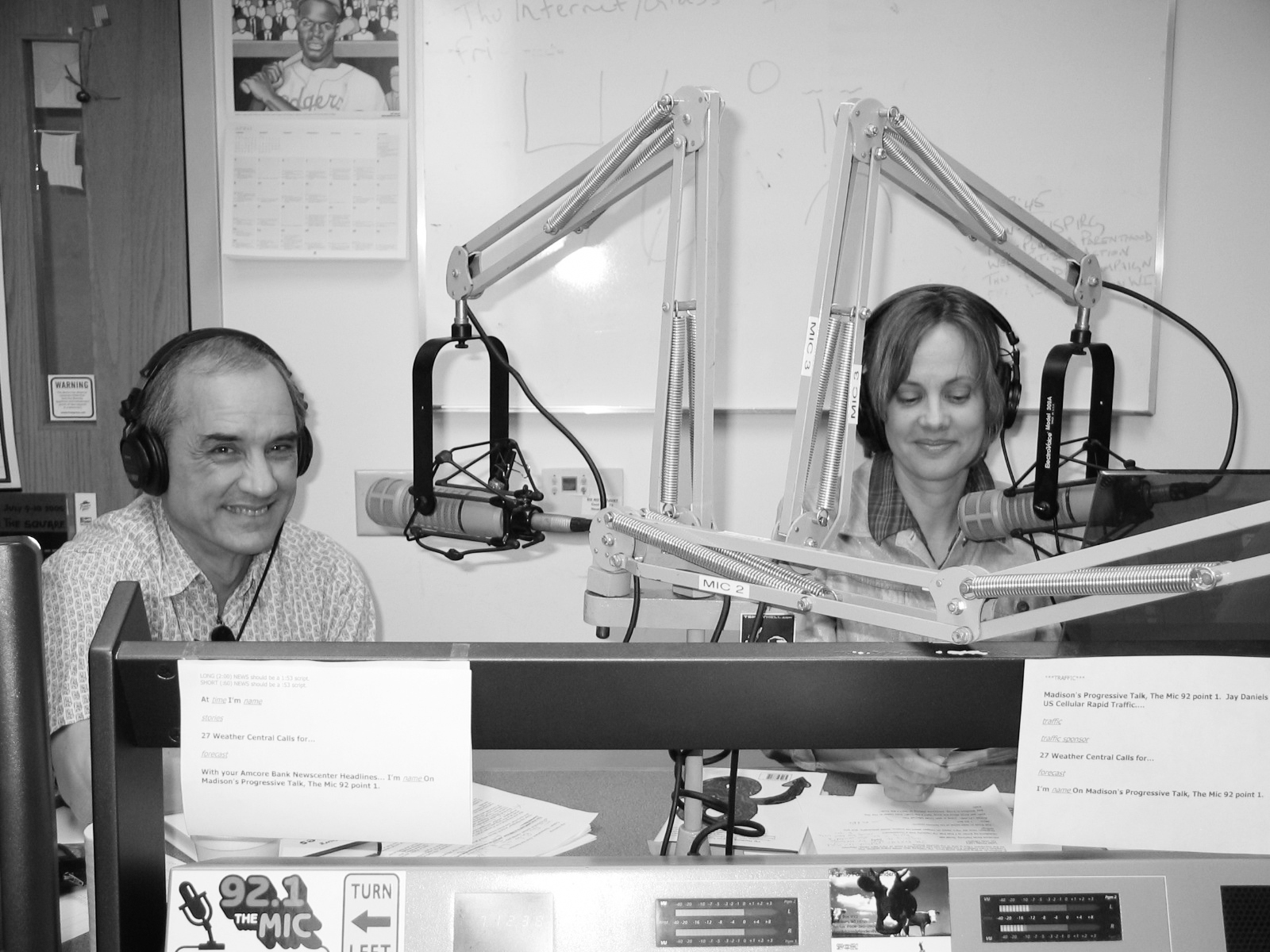
The Freedom From Religion Foundation's radio show has been unceremoniously yanked off the air locally.
FFRF received belated notice this morning that the broadcast of its decade-long radio program, Freethought Radio, has been canceled by the Madison, Wis., radio station formerly known as "Progressive Talk" The Mic 92.1.
The news wasn't a complete surprise, says Annie Laurie Gaylor, who hosts the lively program with her husband, Dan Barker. The couple are co-presidents of the Madison-based state/church watchdog and freethought advocacy group.
"We opened up the Wisconsin State Journal the morning after the election to read the remarkable announcement that progressive talk had been banished forthwith on 92.1 FM and replaced with around-the-clock Christmas music!" says Gaylor. "It's not exactly the appropriate vehicle for Freethought Radio now."
Freethought Radio, which specializes in "irreverent views, music, news and interviews," will not go off the air. It broadcasts in Janesville, Wis., on Community Radio 103.5 FM WADR, as well as in cities in Michigan, Missouri, New York, New Hampshire, Vermont, Texas and Alberta, Canada. (See details here.) The podcast additionally reaches tens of thousands every week, as well. For several years when it was associated with Air America, FFRF's radio show aired in more than 35 listener areas, including several major markets, such as New York City.
Since the past year, the show has been produced in-house in the Stephen Uhl Friendly Atheist Studio, part of FFRF's newly expanded Freethought Hall office building in downtown Madison.
Unfortunately, 92.1 FM did not give FFRF the courtesy of officially notifying it in time to change the credits in this week's show, which was prerecorded Thursday. So, please ignore the opening reference reporting that Freethought Radio originally broadcasts this Saturday from "Progressive Talk."
Area listeners — or anyone — can now listen via podcast, which has gone up today instead of waiting until the usual Monday schedule. This week's show talks about the elections as it relates to the direction of the Supreme Court, plays a defiant version of Woody Guthrie's "This Land Is Your Land" by Sharon Jones, reports recent FFRF legal victories, and includes an interview with a former nun who is now a none (as in no religion) and has a new book about the experience.
Barker says FFRF is looking into other Madison broadcast options.
"We're looking at this as an opportunity rather than a disruption," he says. "Stay tuned."
Georgia school district scraps bible class after FFRF complaint
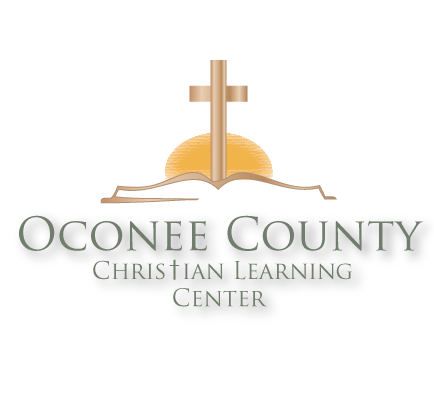 A Georgia school district scrapped plans for a proposed bible class partnership with a local Christian group after the Freedom From Religion Foundation complained.
A Georgia school district scrapped plans for a proposed bible class partnership with a local Christian group after the Freedom From Religion Foundation complained.
In September, FFRF sent a letter to Oconee County Schools that detailed multiple violations in its school system of the constitutional separation of state and church. A particularly disturbing instance concerned a student being tormented for not joining in the Lord's Prayer led by the North Oconee High School head basketball coach, David Gascho. Other students taunted him on a school bus with taunts of "Kill the Jew" and "Massacre the Jews," according to the student's family. Among the violations the school district engaged in was its proposed partnership with the Oconee County Christian Learning Center for religious release time classes and possibly a bible class for credit. The bible class was meant to cover "divisive topics like abortion, evolution and gay marriage," the local newspaper reported. On all these issues, the Learning Center has a theocratic stance, with an absolutist approach against abortion, a dismissal of evolution in preference of creationism, and a condemnation of homosexuality as "sin."
FFRF warned the school district that the partnership was unconstitutional and illegal.
"The Establishment Clause of the First Amendment prohibits public school sponsorship or involvement in devotional school instruction," FFRF Staff Attorney Andrew Seidel wrote to Oconee County Schools Superintendent Jason Branch. "Just as Oconee County Schools cannot teach the bible as truth or creationism as science, it cannot give credit to students who receive those lessons outside schools."
FFRF has received official word that the school district has abandoned plans for the biblical partnership, and is happy that its complaint helped bring this about.
"The various incidents taking place in the Oconee school district are alarming," says FFRF Co-President Annie Laurie Gaylor. "We're glad that we've been able to push back, on the partnership, as well as the praying, which also seems to have paused after our complaint."
The Freedom From Religion Foundation is a nationwide nonprofit organization dedicated to the separation of state and church, with more than 23,000 nonreligious members across the country, including 400-plus in Georgia and an Atlanta-area chapter.
FFRF fighting like hell for your rights
By Annie Laurie Gaylor & Dan Barker
Co-Presidents
Freedom From Religion Foundation
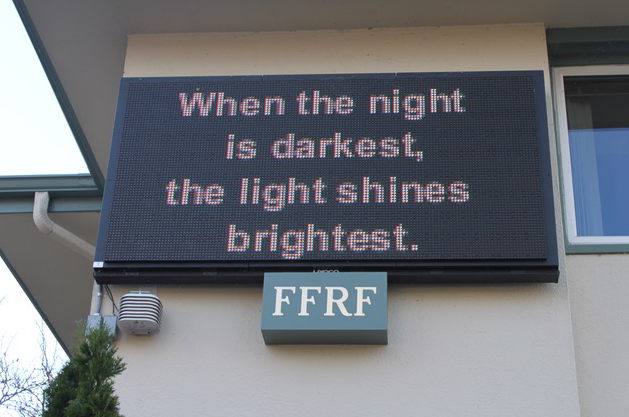
The Freedom From Religion Foundation's digital marquee today at Freethought Hall reads: "When the night is darkest, light shines brightest."
The Freedom From Religion Foundation is not a partisan office or group. But we are realists. Those who care about the separation between religion and government, as well as religion's continuing grip on social policy in the United States, must be cognizant that Nov. 8 was a game-changer — and not a positive one for our essential work to buttress the Establishment Clause of the First Amendment.
That's because President-elect Donald Trump has vowed to repeal the Johnson Amendment that governs church politicking. That law properly prohibits 501(c)(3) nonprofits from abusing their privilege by electioneering in tax-free institutions with tax-deductible donations.
What looked like a phony election-year promise now has now changed into a bona fide threat. If "stained glass money" turns into "dark money," political churches could function as unaccountable political money laundering machines and religious denominations would become PACs. Our secular republic would be imperiled.
Even more distressing is losing the chance — seemingly just within grasp — to swing the Supreme Court back to the secular side. It's not just that the next president will choose Scalia's replacement and break the 4-4 tie, but potentially will be given the opportunity to replace sympathetic justices, including the Divine RBG, age 83, Stephen Breyer, 78, and the reputed "swinger," Anthony Kennedy, age 80.
One bright piece of election news comes out of Oklahoma, where voters soundly rejected a referendum to rewrite the state constitution to allow direct government subsidy of religion.
Our second rotating marquee message today promises: "We're going to fight like hell for your rights." Our work has never been more important.
Freedom depends on freethinkers. Thank you for your support.
Attend Freedom From Religion Foundation’s Veterans Day observance
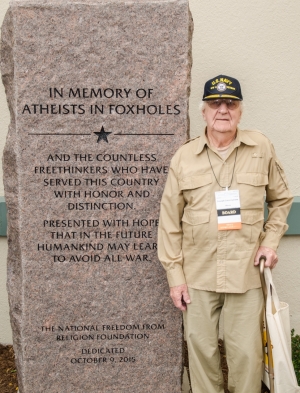 The Freedom From Religion Foundation is holding a special Veterans Day commemoration on Friday, Nov. 11, to honor those who have served, including "atheists in foxholes." About a quarter of FFRF's members are veterans or in the military.
The Freedom From Religion Foundation is holding a special Veterans Day commemoration on Friday, Nov. 11, to honor those who have served, including "atheists in foxholes." About a quarter of FFRF's members are veterans or in the military.
The event will be held at the "Atheists in Foxholes" monument in the Rose Zerwick Memorial Garden and Courtyard at FFRF's office building, Freethought Hall, in downtown Madison, Wis., starting at 10:30 a.m. There will be a special photo-op for veterans at the monument. The media and the public are invited to attend.
The monument, which was dedicated last year during a grand opening celebration for the renovated Freethought Hall, is dedicated to "ATHEISTS IN FOXHOLES and the countless freethinkers who have served this country with honor and distinction. Presented with hope that in the future humankind may learn to avoid all war."
The 7-foot-tall, 4,743-pound monument, made of the same South Dakota granite that Mount Rushmore is carved from, reflects the long windows that are part of the original 1855 building and provides a focus for the memorial garden and courtyard adjacent to Freethought Hall's refurbished entrance. A teak bench opposite the monument provides a spot for reflection.
"FFRF has strong support among current members of our armed forces and veterans," says FFRF Co-President Annie Laurie Gaylor. "Our monument honors nonreligious veterans, serving as a reminder to our nation that — contrary to that tired, untrue cliché — there are indeed many 'atheists in foxholes.'"
Please check in at the lobby. There will be socializing, hot beverages and cookies in FFRF's capacious Charlie Brooks Auditorium following the program. There's no RSVP required, but help refreshments planning by emailing This email address is being protected from spambots. You need JavaScript enabled to view it. or by calling 608-256-8900 9-5 by Nov. 10, with number of attendees.
The Freedom From Religion Foundation is a Madison, Wis.-based national state/church watchdog organization with more than 23,000 nonreligious members all over the country, including 1,300-plus in Wisconsin and thousands of people who are serving or have served our nation.
FFRF complains over partisan politicking
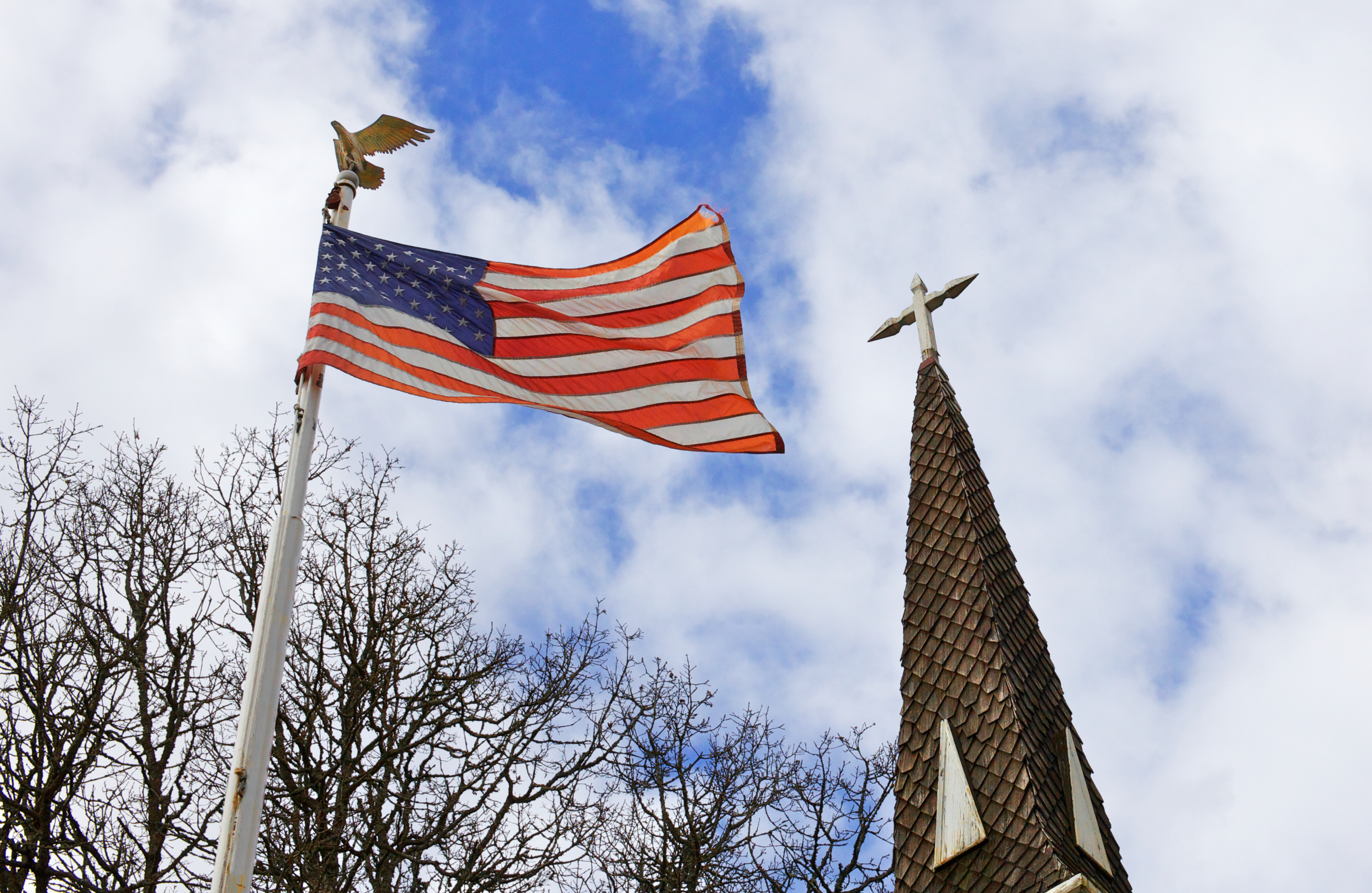
Photo via Shutterstock by Bobkeenan Photography
Churches should never engage in partisan electioneering.
The Freedom From Religion Foundation has recently acted on 15 electioneering complaints, sending letters to the IRS reporting illegal campaign intervention on the part of churches in different parts of the country. Some of the most egregious cases have been within the last few weeks, including a flyer distributed at a California church that told parishioners: "It is a mortal sin to vote Democrat." In another instance, a pastor of a Roman Catholic Church in Rhode Island said: "I cannot vote for Mrs. Clinton, since my immortal soul would be in peril by cooperating in the destruction of innocent human life." And these are just two examples.
On election eve, it's worth revisiting what are permissible campaign activities for churches to engage in and what are not.
Like all nonprofits organized under 501(c)(3) of the tax code, such as FFRF, churches must abide by strict guidelines that prohibit partisan election activity. The code states in relevant part that 501(c)(3) organizations cannot "participate in, or intervene in (including the publishing or distributing of statements), any political campaign on behalf of (or in opposition to) any candidate for public office." While leaders of churches or religious organizations may express their opinions on political matters as individuals, they are precluded from making "partisan comments in official organization publications or at official functions of the organization."
In order to cross the line and unlawfully endorse a candidate, pastors don't need to say any magic words like "Vote for Candidate A" or "Don't cast your ballot for Candidate B." They can even cross that line by expressing that sentiment without telling a parishioner directly. Churches should not even tacitly express favor or disfavor of a particular candidate.
Over the years, FFRF has reported hundreds of churches that have violated these prohibitions. In 2012, FFRF sued the IRS to compel it to enforce its own regulations barring churches as well as other (c)(3)s from engaging in partisan political activity. It is proud that the lawsuit nudged the IRS to agree to continue to investigate errant churches and ensure that the tax code is being enforced evenhandedly.
Tax-exempt 501(c)(3) organizations may either maintain neutrality and stay tax-exempt or endorse candidates and pay taxes. The choice is theirs. As the law stands, religious leaders are free to endorse whomever they choose, so long as they do so on their own time in their capacity as citizens, not from the pulpit and not as church officials using church resources. This rule is known as the Johnson Amendment, after Lyndon B. Johnson, the Texas senator and later president who helped pass the law in 1954. (GOP presidential candidate Donald Trump has vowed to repeal the rule, but it is currently the law of the land.)
James Madison wrote, "to employ religion as an engine of civil policy" was "an unhallowed perversion of the means of salvation."
Churches would do well to listen to this Founding Father.
The Freedom From Religion Foundation is a national organization dedicated to the separation of state and church, with more than 23,000 nonreligious members all around the country.
Four honored for secular invocations
The Freedom From Religion Foundation announced the four winners of its 2016 "Nothing Fails Like Prayer" contest. The competition is set up to honor nontheistic activists who give secular invocations in front of local governmental bodies.
The winners are:
— Aleta Ledendecker of Tennessee had her initial invocation on Jan. 11 before the City Council in Oak Ridge, Tenn., cut short in mid-sentence by the mayor, even though she had 30 seconds left of her designated time. After Ledendecker and FFRF protested, she was allowed to return to give the full opening remarks. Ledendecker was a "presidents' choice" awardee. Ledendecker, an FFRF Lifetime Member, is founder of the newest FFRF chapter, FFRF East Tennessee.
— Justin Scott of Iowa gave his invocation on May 2 before the City Council in Waterloo, Iowa. He also persuaded the city to proclaim a "Day of Reason" on May 5 to balance the National Day of Prayer. Scott was one of two who won a popular vote by FFRF members and its Facebook followers. Scott won international attention with his one-man campaign as an atheist to publicly question, prior to the Iowa Caucus, every presidential candidate on secular issues.
— David Suhor of Florida is a co-founder of the Satanic Temple West Florida, who sang his invocation before the Pensacola City Council on July 14. He is a musician and teacher who sang text originally written by Lucien Greaves, co-founder of The Satanic Temple. He won the popular vote. Suhor is also a litigant in FFRF's and the American Humanist Association's lawsuit against a 25-foot-tall cross in Pensacola's public Bayview Park.
— David Williamson of Florida has given multiple secular invocations since 2014 and also organized others to give them. He is a plaintiff in the federal lawsuit filed over censorship of a secular invocation in Brevard County, Fla., brought by FFRF, Americans United and the ACLU. Williamson was a "presidents' choice" awardee. Williamson is founder of FFRF's chapter, Central Florida Freethought Community.
All four honorees received expense-paid trips to repeat their secular invocations at FFRF's 39th annual national convention in Pittsburgh. Each also received a formal plaque and a $500 honorarium.
"We're proud of all the contestants for their success in balancing governmental prayer," says Annie Laurie Gaylor, FFRF co-president. Gaylor praised activists for their persistence and diligence, and willingness to speak publicly.
The new contest for 2017 opened on Sept. 1 and ends Aug. 1, 2017. The winner or winners will be attending FFRF's 40th annual national convention in Madison, Wis., Sept. 15-17, 2017.
The contest began in response to an unfortunate ruling by the U.S. Supreme Court in 2014 "blessing" sectarian prayers by city and county governments. The silver lining in that ruling was the court's qualification that the practice is permissible — providing all comers, including atheists and religious minorities, are permitted to participate.
"We'd like to see secular citizens flood government meetings with secular invocations that illustrate why government prayers are unnecessary, ineffective, embarrassing, exclusionary, divisive or just plain silly," adds Dan Barker, FFRF co-president.
FFRF helps get humanism into prison system
Humanism is now an officially recognized religion throughout the Virginia prison system after FFRF stepped in and helped out a prisoner there.
Christopher Landeck, a freethinking inmate at Coffeewood Correctional Center in Virginia, contacted FFRF because his prison had meeting options for Christians, Jews, Hindus, Muslims and a variety of other minority religious groups, but no opportunity for nonreligious inmates to meet and converse about their beliefs.
"Where inmates are demoralized, dehumanized, subjugated and silenced on a daily basis, humanist ideals should help restore the humanity and fill the vacuity that life behind bars carves out of the individual," Landeck wrote.
Landeck applied to start a humanist study group with equal access to prison chapel resources, but was denied because the Virginia Department of Corrections (VADOC) did not recognize humanism on its list of "Religions Approved to Operate in DOC Facilities." Because of that, Landeck was being effectively denied the opportunity to meet with like-minded prisoners to discuss his beliefs.
FFRF Staff Attorney Sam Grover sent a letter to the VADOC in February 2016 to argue for equal access to prison chapel resources for nonreligious inmates. After a back and forth between FFRF and the prison, humanism became an officially recognized religion throughout the Virginia prison system as of June 22. Subsequently, Landeck's group was also approved at Coffeewood Correctional.
"Thanks to FFRF, we have the ability to offer an alternative lifestance for inmates not affiliated with traditional religions and nonbelievers that only attend religious services in order to feel part of something larger than themselves, " Landeck wrote to FFRF. "Freethinking inmates are now excited to be able to organize into groups of like-minded individuals to talk about substantive issues of the day, philosophy, art and culture, and most importantly, a productive secular life after prison.
Inmates who adopt a worldview of inclusiveness will find themselves in a much healthier paradigm and better prepared for re-entry into society."
With a humanist study group now operating at the prison, the participants are eager for educational materials about atheism and freethought. So FFRF Co-President Dan Barker and FFRF agreed to donate 11 books to the prison chapel library so that all inmates have access to nonreligious views.
"It is our sincerest wish that these books will help enlighten many inmates on what it means to be 'good without God' and inspire them to lead a purpose-filled life," Barker wrote to Chaplain Burke at the facility. The donated books were written by Barker (Life Drive Purpose, The Good Atheist, Godless, God: The Most Unpleasant Character in Fiction), FFRF Co-President Annie Laurie Gaylor (Woe to the Women: The Bible Tells Me So, Women without Superstition: 'No Gods — No Masters') and FFRF founder Anne Nicol Gaylor (Lead Us Not Into Penn Station), among others.
If you would like to donate books or other materials in "new" condition to the humanism group at the prison, please send them, along with a list of their titles and retail values, to:
Chaplain Burke
Coffeewood Correctional Center
P.O. Box 500
Mitchells, VA 22729-0500
FFRF analysis: Record 26 million ‘Nones’ could vote
More than 26 million voters with no religion could turn out on Election Day Nov. 8, dwarfing previous records and providing the power to sway the direction of the country for the first time in history, according to an analysis from the Freedom From Religion Foundation.
The ranks of atheists, agnostics and those with no religious affiliation — the "Nones" — have increased by 19 million since Barack Obama was first elected president in 2008, according to Pew Research, making them the fastest growing "religious" group in America. In 2004, the Nones comprised just 16 percent of all American adults, but have now grown to represent a quarter of all adults and a third of Millennials.
Despite their size, the Nones have been underrepresented at the ballot box. According to the Public Religion Research Institute (PRRI), religiously unaffiliated voters comprised just 12 percent of all voters in the 2012 presidential election.
However, their participation is set to spike in 2016, according to FFRF's new analysis of data on religious affiliation and voting participation, drawn from numerous sources.
Popular vote projections by FiveThirtyEight.com in mid-October showed Democrat Hillary Clinton with a lead (49%) over Republican Donald Trump (43%), with the remainder of voters supporting third-party candidates.
Using the 2012 popular vote (128.6 million) as a base, we can project that more than 63 million votes would go to Clinton and approximately 55 million would go to Trump using those percentages.
How would that break down by religious affiliation? Approximately 30 percent of Clinton's supporters are religiously unaffiliated and 13 percent of Trump supporters meet that definition, according to PRRI.
That means Clinton could receive almost 19 million votes and Trump could receive more than 7 million votes from the Nones. That's more than 26 million projected votes for the major party candidates, a more than 70% increase from the 15 million Nones who turned out during the 2012 election.
"This election could be a flashpoint where secular voters finally eclipse other major religious groups in terms of turnout and influence," says FFRF Co-President Annie Laurie Gaylor. "It's time that candidates acknowledge our presence and commit to keeping religion out of government."
Earlier this year, FFRF launched its "I'm Secular and I Vote" campaign to mobilize voters across the country through national TV, billboard and bus campaign ads, featuring young Millennial voters. FFRF is also enlisting students on college campuses and launching a digital marketing campaign to reach voters online. Ninety-six percent of FFRF's membership is registered to vote, according to a member survey.
"The next president will have the power to determine the direction of the Supreme Court for a generation," says Gaylor. "We expect secular voters to come out in force and make their voices heard."
Donate now to FFRF through CFC, AmazonSmile
There are a few ways you can donate to FFRF, including directly through our website, through the CFC or AmazonSmile.
If you are a federal employee, you may now make donations to FFRF though the CFC (Combined Federal Campaign) until Dec. 15. If you wish to help FFRF through this campaign, the CFC code to designate your contribution to FFRF is 32519.
It is recommended that all CFC donors check the box to include their name and mailing address (in addition to e-mail) with the donation. Donors will receive an acknowledgment from FFRF when we receive pledge notification (throughout the year).
From the CFC website: "The CFC is the official workplace giving campaign of the federal government. The mission of the CFC is to promote and support philanthropy through a program that is employee focused, cost-efficient and effective in providing federal employees the opportunity to improve the quality of life for all. The CFC is the world's largest and most successful annual workplace charity campaign."
Another way to donate automatically is through AmazonSmile. It's a simple way for you to support FFRF (or other charitable organizations) every time you shop, at no cost to you. When you shop at smile.amazon.com, you'll find the exact same prices, selection and shopping experience as Amazon.com, with the added bonus that Amazon will donate a portion of the purchase price to your favorite charitable organization. Visit our AmazonSmile donation designation page and select the Freedom From Religion Foundation to donate 0.5% of eligible purchases to FFRF.
The AmazonSmile Foundation is a 501(c)(3) private foundation created by Amazon to administer the AmazonSmile program. All donation amounts generated by the program are remitted to the AmazonSmile Foundation. In turn, the AmazonSmile Foundation donates those amounts to the charitable organizations selected by their customers. Amazon pays all expenses of the AmazonSmile Foundation; they are not deducted from the donation amounts.
Cliff Richards Student Activist Award: Being an activist in Bangladesh can be deadly - By Muhammad Shohiduzzaman
Muhammad Shohiduzzaman received $2,000 in late September from FFRF as a Cliff Richards Student Activist.
By Muhammad Shohiduzzaman
My name is Muhammad Shohiduzzaman and my pen name is Paplu Bangali. I am a blogger, a student activist and a theatre activist in Bangladesh. I am an atheist, even though I come from a conventional Muslim family.
I was born in a small village in the Sylhet District in Bangladesh. It's a multicultural area where Christian, Hindu and Buddhist religious minorities live among the Muslim majority. People in my village are very religious and conservative.
I attended a government primary school and then at the age of 14 I was sent to my uncle's house in Upazlia to get a better education. After finishing my secondary education there, I enrolled in business studies at Madan Mohan College in Sylhet. That was when I first got involved with social, cultural and political movements, including theatre activism.
For the last decade, I have been working on various social issues, including human rights of religious minorities, violence against women, religious fanaticism, and secular and science based-education.
I have been writing in the areas of freethinking, criticizing Islamic fundamentalism and repression of religious minorities. Recently, I have been active in raising voices against the killings of bloggers. I organized and led protests and rallies demanding justice for all these murdered bloggers and freethinkers in Bangladesh. Many national print and electronic media interviewed me about this movement because we have been demanding the arrests of the killers.
As a civil society activist, I founded and/or worked with a number of organizations and political networks:
Bangladesh Student Union (BSU): I have been a member of BSU since 2010 and the ex-president of the Sylhet district committee. BSU was established in 1952 and is an independent, democratic, leftist political network that primarily works for the rights of students in Bangladesh. Its membership exceeds 20,000 students. The mission of BSU is to establish a nondiscriminatory science-based secular and uniform education system.
Bangladesh Udichi Shilpigosthi: I have been a member since 2008. It is the largest anti-sectarian, progressive and voluntary organization in Bangladesh, which plays a significant role in all secular and cultural movements in Bangladesh. Since its inception, the organization is engaged in raising awareness among the public through cultural activities — songs, dances, recitations, dramas, films, fine arts and literary works.
Youth for National Interest: I am the founder of Jatyo Sharthe Amra Tarunno (Youth for National Interest), which was established in 2013. I worked as the coordinator until I left Bangladesh in March 2016. We organized civil society campaigns against all forms of sexual abuse and violence faced by children and women.
Blogger & Online Activist Forum: I am also a founding member and organizer of this group in Sylhet since 2012. This forum promotes freethinking and the rights of online bloggers and other freethinkers. We organized various civil society campaigns against arrests and killings of bloggers.
Transparency International-Bangladesh: The Youth Engagement and Support (YES) group is a movement initiated by Transparency International-Bangladesh (TIB) to engage and empower the youth of Bangladesh to address issues related to corruption. I worked as a volunteer in this group from 2006 to 2012, helping raise awareness against corruption, organizing and participating at protests against sexual violence faced by women and children, and in other issues related to women's empowerment. I performed in different street dramas as a theater actor. I was also a scriptwriter for these dramas.
As a result of my activism, I was physically attacked three times by Islamic fundamentalists
• On Dec. 23, 2013, a religious extremist group threatened to kill me. I reported this to the Sylhet police, but they did not respond. Furthermore, a local religious extremist group organized a procession against bloggers and freethinkers in Sylhet, and shouted slogans against me and other bloggers. The group also threatened to kill us. I found out that I am at the top of its list because of my anti-religious fundamentalism activities and my demand for justice against the murdered bloggers.
• On Jan. 11, 2014, I was attacked by a group of fundamentalists with the intent to kill me. Fortunately, I managed to save my life; however my head was injured and my right hand was fractured. I stayed in the university medical facility for two days. I was attacked because I organized the protest with Youth for National Interest days earlier. The protest condemned Bangladesh's widespread attacks against religious minorities, and we demanded justice for victims of human rights violations.
• On May 12, 2015, I organized a protest in Sylhet against the murder of blogger Ananta Bijoy Dash after he was killed by fundamentalists. During the protest, members of the ruling party's student league attempted to attack me because I was the main organizer. I was taken to a safe place by other protesters. However, I then found out that some of my activist friends were physically attacked by them.
• On Feb. 4, 2016, I was attacked while I was traveling by rickshaw to my home in Sylhet. Six unidentified persons dragged me out of the rickshaw and called me "nasthik," which means atheist. Then they physically assaulted me. Fortunately, bystanders intervened and saved me from the attackers. I reported the attack to the local police, but they did not take any steps for my safety. They just told me to leave Bangladesh because it was not safe for me to stay.
The current Bangladesh government keeps silent over the killings of bloggers and freethinkers because the government is keen to maintain its ties to the fundamentalist groups in order to hold onto its political power. Therefore, there has been no action taken against the fundamentalist groups, so the religious extremist groups, as well as ruling party's supporters, targeted me.
I made a general complaint to the police station two times regarding the attacks on me. However, the police failed to take any action. After the incident on Jan. 11, 2014, with the assistance of my political friends, I sought temporary relocation to a rural village in Bangladesh. After that, I returned to the city, and changed my place of residence. Following the incident on May 12, 2015, I took similar precautions and changed my residence again. After the incident on Feb. 4,, 2016, I moved to Dhaka with the help of my fellow bloggers.
In Dhaka, I contacted Forum Asia and it, in collaboration with INFORM Human Rights Documentation Centre in Sri Lanka, assisted me in temporarily relocating to Sri Lanka. I stayed there for five months under a tourist visa. Then in August of this year, I was relocated to the Philippines with the help of PAHRA (Philippine Alliance of Human Rights Advocates).
Several of my colleagues, including Nazimuddin Samad, who denounced the last attack I faced, were killed while I was in Sri Lanka. Such attacks clearly indicate that returning to Bangladesh is impossible and life-threatening. Therefore, I am in need of a long-term relocation. Currently I am looking for an opportunity to enroll in a post-graduate course.
So while I vow to continue my activism and education, I must do it outside of Bangladesh.
Cliff Richards Student Activist Award: Being an activist in Bangladesh can be deadly - By Muhammad Shohiduzzaman
Muhammad Shohiduzzaman received $2,000 in late September from FFRF as a Cliff Richards Student Activist.
By Muhammad Shohiduzzaman
My name is Muhammad Shohiduzzaman and my pen name is Paplu Bangali. I am a blogger, a student activist and a theatre activist in Bangladesh. I am an atheist, even though I come from a conventional Muslim family.
I was born in a small village in the Sylhet District in Bangladesh. It's a multicultural area where Christian, Hindu and Buddhist religious minorities live among the Muslim majority. People in my village are very religious and conservative.
I attended a government primary school and then at the age of 14 I was sent to my uncle's house in Upazlia to get a better education. After finishing my secondary education there, I enrolled in business studies at Madan Mohan College in Sylhet. That was when I first got involved with social, cultural and political movements, including theatre activism.
For the last decade, I have been working on various social issues, including human rights of religious minorities, violence against women, religious fanaticism, and secular and science based-education.
I have been writing in the areas of freethinking, criticizing Islamic fundamentalism and repression of religious minorities. Recently, I have been active in raising voices against the killings of bloggers. I organized and led protests and rallies demanding justice for all these murdered bloggers and freethinkers in Bangladesh. Many national print and electronic media interviewed me about this movement because we have been demanding the arrests of the killers.
As a civil society activist, I founded and/or worked with a number of organizations and political networks:
Bangladesh Student Union (BSU): I have been a member of BSU since 2010 and the ex-president of the Sylhet district committee. BSU was established in 1952 and is an independent, democratic, leftist political network that primarily works for the rights of students in Bangladesh. Its membership exceeds 20,000 students. The mission of BSU is to establish a nondiscriminatory science-based secular and uniform education system.
Bangladesh Udichi Shilpigosthi: I have been a member since 2008. It is the largest anti-sectarian, progressive and voluntary organization in Bangladesh, which plays a significant role in all secular and cultural movements in Bangladesh. Since its inception, the organization is engaged in raising awareness among the public through cultural activities — songs, dances, recitations, dramas, films, fine arts and literary works.
Youth for National Interest: I am the founder of Jatyo Sharthe Amra Tarunno (Youth for National Interest), which was established in 2013. I worked as the coordinator until I left Bangladesh in March 2016. We organized civil society campaigns against all forms of sexual abuse and violence faced by children and women.
Blogger & Online Activist Forum: I am also a founding member and organizer of this group in Sylhet since 2012. This forum promotes freethinking and the rights of online bloggers and other freethinkers. We organized various civil society campaigns against arrests and killings of bloggers.
Transparency International-Bangladesh: The Youth Engagement and Support (YES) group is a movement initiated by Transparency International-Bangladesh (TIB) to engage and empower the youth of Bangladesh to address issues related to corruption. I worked as a volunteer in this group from 2006 to 2012, helping raise awareness against corruption, organizing and participating at protests against sexual violence faced by women and children, and in other issues related to women's empowerment. I performed in different street dramas as a theater actor. I was also a scriptwriter for these dramas.
As a result of my activism, I was physically attacked three times by Islamic fundamentalists
• On Dec. 23, 2013, a religious extremist group threatened to kill me. I reported this to the Sylhet police, but they did not respond. Furthermore, a local religious extremist group organized a procession against bloggers and freethinkers in Sylhet, and shouted slogans against me and other bloggers. The group also threatened to kill us. I found out that I am at the top of its list because of my anti-religious fundamentalism activities and my demand for justice against the murdered bloggers.
• On Jan. 11, 2014, I was attacked by a group of fundamentalists with the intent to kill me. Fortunately, I managed to save my life; however my head was injured and my right hand was fractured. I stayed in the university medical facility for two days. I was attacked because I organized the protest with Youth for National Interest days earlier. The protest condemned Bangladesh's widespread attacks against religious minorities, and we demanded justice for victims of human rights violations.
• On May 12, 2015, I organized a protest in Sylhet against the murder of blogger Ananta Bijoy Dash after he was killed by fundamentalists. During the protest, members of the ruling party's student league attempted to attack me because I was the main organizer. I was taken to a safe place by other protesters. However, I then found out that some of my activist friends were physically attacked by them.
• On Feb. 4, 2016, I was attacked while I was traveling by rickshaw to my home in Sylhet. Six unidentified persons dragged me out of the rickshaw and called me "nasthik," which means atheist. Then they physically assaulted me. Fortunately, bystanders intervened and saved me from the attackers. I reported the attack to the local police, but they did not take any steps for my safety. They just told me to leave Bangladesh because it was not safe for me to stay.
The current Bangladesh government keeps silent over the killings of bloggers and freethinkers because the government is keen to maintain its ties to the fundamentalist groups in order to hold onto its political power. Therefore, there has been no action taken against the fundamentalist groups, so the religious extremist groups, as well as ruling party's supporters, targeted me.
I made a general complaint to the police station two times regarding the attacks on me. However, the police failed to take any action. After the incident on Jan. 11, 2014, with the assistance of my political friends, I sought temporary relocation to a rural village in Bangladesh. After that, I returned to the city, and changed my place of residence. Following the incident on May 12, 2015, I took similar precautions and changed my residence again. After the incident on Feb. 4,, 2016, I moved to Dhaka with the help of my fellow bloggers.
In Dhaka, I contacted Forum Asia and it, in collaboration with INFORM Human Rights Documentation Centre in Sri Lanka, assisted me in temporarily relocating to Sri Lanka. I stayed there for five months under a tourist visa. Then in August of this year, I was relocated to the Philippines with the help of PAHRA (Philippine Alliance of Human Rights Advocates).
Several of my colleagues, including Nazimuddin Samad, who denounced the last attack I faced, were killed while I was in Sri Lanka. Such attacks clearly indicate that returning to Bangladesh is impossible and life-threatening. Therefore, I am in need of a long-term relocation. Currently I am looking for an opportunity to enroll in a post-graduate course.
So while I vow to continue my activism and education, I must do it outside of Bangladesh.
